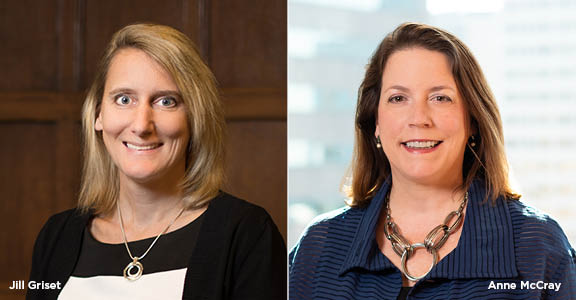
“We do way more than just document review,” said Jill Crawley Griset, partner and co-chair of McGuireWoods’ Discovery Counsel Services Department.
The discovery counsel team comprises about 27 lawyers, paralegals and case assistants in Charlotte and Richmond who devote their practices exclusively to discovery. Yes, that includes document review, but also a lot more. Their services range from ad hoc e-discovery advice to serving as full-scale national discovery counsel to acting as record discovery counsel in pending litigation and government investigations, handling all aspects of preservation, collection, review, production and privilege logs.
Additionally, based on the firm’s long track record in this area, clients often turn to McGuireWoods to structure their own in-house e-discovery programs.
“We’ve done this kind of large-scale discovery — not just e-discovery — for years and years at McGuireWoods and developed tried-and-true practices,” said partner Anne Bentley McCray, also co-chair of the Discovery Counsel Services Department. “That makes it really easy to then provide all of that framework to clients. It’s a ‘teach a man to fish’ kind of thing — show them all the processes and procedures that they can standardize so they’re not reinventing the wheel every time they start an e-discovery project.”
Along these lines, one of the firm’s major clients recently asked McCray to help coordinate an RFP for e-discovery vendors.
“We do discovery work for them all the time. We’re actually doing their document retention policy right now,” she said. “But there are instances where we can’t do work for them for one reason or another, so they want us to be involved in selecting the right vendor and then working with them to implement standardized processes for e-discovery.” McCray noted that the team also does audits of clients’ existing polices and legal holds and helps them get rid of massive amounts of data and documents.
Similarly, for the past seven years, Griset has served as national discovery counsel for one of the firm’s largest clients. “If e-discovery issues come up on any of their cases,” she said, “their lawyers are supposed to call our national discovery counsel team.”
Griset helped the client develop all of its in-house discovery processes, which included designing document review forms, determining how information should be tagged, fine-tuning the ins and outs of their database settings, and more. Griset and her team then trained all of the client’s lawyers on the new procedures, and they continue to update and revamp these processes as necessary.
The client also asked Griset and her team to craft training and guidelines for its other outside law firms. Now, for cases in which McGuireWoods is not directly involved, the client’s other outside counsel are required to complete McGuireWoods’ online e-discovery training program.
There are plenty of opportunities for attorneys outside of the group to offer the firm’s discovery services. Said McCray, “Ask clients if they have a legal hold policy and procedures; whether they have e-discovery playbooks or processes; whether they’re using vendors and how they’re selecting them.”
“We train outside law firms on how to do e-discovery, so we have a huge set of training materials that people, I’m sure, don’t know about,” said Griset. “So if people want to learn more about e-discovery, there is a lot of training we can give them access to. They just need to ask.”